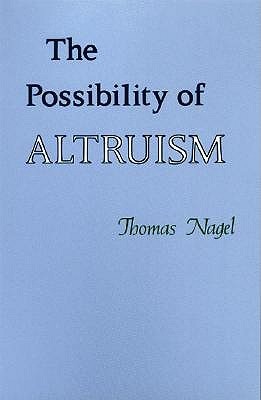
The Possibility of Altruism
Book Description
What if true altruism is not just a dream but a profound possibility? In "The Possibility of Altruism," Thomas Nagel delves into the depths of human morality, challenging the very core of self-interest. With piercing clarity, he unravels the intricate web of motivations that drive us to care for one another. It's a bold exploration of ethics that questions whether genuine selflessness can coexist with our instinctive desires. As the stakes of compassion rise, the tension between egoism and altruism takes center stage. Can we transcend our own wants to embrace a higher moral calling? This book dares to ask: is there more to humanity than just survival?
Quick Book Summary
In "The Possibility of Altruism," Thomas Nagel examines whether genuine selflessness is truly achievable or merely an idealistic dream. Challenging the dominant philosophical notion that human action is fundamentally egoistic, Nagel contends that moral motivation—particularly the capacity for altruism—is not only possible but rooted in rationality itself. He dissects the psychological and ethical underpinnings of why and how individuals can act for the sake of others, apart from self-interest. By articulating the distinction between egoism and altruism, and exploring the nature of reasons for action, Nagel constructs a nuanced account of morality. The book thoughtfully addresses whether ethical considerations can have objective force, ultimately arguing that the possibility of altruism is intrinsic to our moral framework and essential for meaningful ethical life.
Summary of Key Ideas
Table of Contents
The Challenge of Egoism and Self-Interest
Thomas Nagel begins by framing the classic philosophical debate between egoism and altruism, addressing the widespread belief that all human actions are ultimately motivated by self-interest. He contends that this reductionist view fails to capture the full complexity of human moral psychology. Nagel challenges the presumption that we are incapable of acting for genuinely selfless reasons, setting the stage for his exploration of whether altruism is a logical and practical possibility.
Rationality as the Basis of Moral Motivation
Central to Nagel’s project is the argument that rationality underpins moral motivation. He posits that the same rational faculties that guide us in pursuing our own good can also provide impartial reasons to act for others. By analyzing how we justify actions to ourselves and others, Nagel demonstrates that moral obligations stem from a universal perspective—a stance that compels us to consider the interests of others with the same importance as our own.
Understanding Reasons for Action
Nagel’s exploration of reasons for action emphasizes the difference between subjective motivations and objective justifications. He analyzes how personal preferences can be distinguished from reasons that have normative force for anyone in similar circumstances. This distinction allows Nagel to show that altruistic motives are not merely derived from disguised self-interest, but rather are grounded in the capacity to recognize the legitimacy of others’ needs and values as reasons for action.
Objectivity in Moral Judgments
A significant portion of the book examines the objectivity of moral judgments. Nagel refutes skepticism about morality by arguing that ethical claims can have reason-giving authority independent of individual desires. He asserts that adopting an impersonal or impartial perspective is both possible and required for genuine moral consideration. This objectivity, Nagel claims, is not abstract or alienating but arises naturally from the rational structure of human thought and interaction.
The Necessity of Altruism in Ethical Life
In concluding, Nagel maintains that altruism is not only possible but essential to any coherent theory of ethics. Without the possibility of arguments and motivations that extend beyond individual benefit, moral life loses its meaning. By tracing the roots of altruism to the fundamental features of rationality and moral reasoning, Nagel provides a powerful philosophical foundation for the existence of genuine concern for others.
Download This Summary
Get a free PDF of this summary instantly — no email required.





